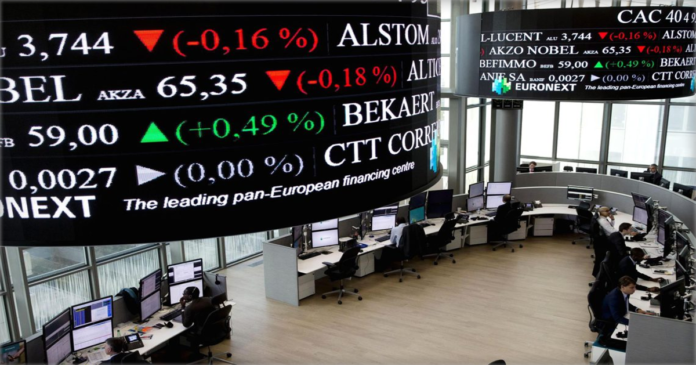European stocks rebound on Monday after falling the previous week due to fresh concerns about more aggressive US interest rate increases, according to dealers.
Midday gains in London were 0.8 percent, while early afternoon gains in eurozone stock markets in Frankfurt and Paris were 1.5 percent.
Concern over the demand outlook in the world’s largest energy consumer, the United States, pushed oil prices down a little on Monday.
Investors ignored the inflation and interest rate worries that plagued markets last week, according to AJ Bell stockbroker’s investment director Russ Mould.
This was contrary to the attitude that was prevalent in Asia, which followed the example set by the United States and saw material declines.
Following a pre-weekend selloff in Europe and on Wall Street, US inflation data that beat forecasts confirmed concerns that the Federal Reserve will keep raising interest rates for some time, causing Asian indices to decline.
The personal consumption expenditures price index came after promising job data and other information that suggested prices were declining more slowly than anticipated.
The Fed’s ability to soon stop its monetary tightening and perhaps reduce borrowing costs before the end of the year has been destroyed by this month’s news.
Central Bank Officials Signal Potential for Further Tightening
This week, traders will be closely monitoring any additional remarks made by bank officials.
Some officials said they saw potential for further tightening after Friday’s data report, and several have already signalled they are open to raising by 50 basis points at the next meeting.
In his note, Chris Weston of Pepperstone Group expressed that there are still clouds of uncertainty and that the market’s belief that inflation would decrease throughout the year has been challenged.
The possibility of additional rate hikes by the Fed sent the dollar soaring against its counterparts on Friday, and it maintained those gains in Asian trading, reaching a two-year high against the yen.
Furthermore, The man who is anticipated to lead the Bank of Japan made statements on Friday that suggested he will continue an ultra-loose monetary policy for the time being, which contributed to the yen’s decline.
It did so despite data showing Japanese inflation at its highest level in four decades.
Important data about 11:45 GMT
FTSE 100 in London is up 0.8 percent at 7,944.88 points.
Frankfurt’s DAX rose 1.5% to 15,435.81.
Paris’ CAC 40 is up 1.6% at 7,299.08 percent.
EURO STOXX 50: At 4,253.34, up 1.8 percent
Tokyo’s Nikkei 225 closed at 27,423.96 down 0.1 percent (close)
At 19,943.51, the Hong Kong Hang Seng Index is down 0.3 percent (close)
Shanghai Composite: 3,258.03 is down by 0.3 percent (close)
New York – Dow: DOWN 1.0 percent at 32,816.92 (close)
Dollar/yen: down from Friday’s 136.48 yen to today’s 136.23 yen
Dollar/euro: up from $1.0548 to $1.0561
Dollar/pound: Up from $1.1944 to $1.1976.
Down at 88.19 pence from 88.31 pence for the euro/pound.
At $82.75 a barrel, Brent North Sea crude is down 0.5 percent.
At $76.17 per barrel, West Texas Intermediate is down 0.2 percent.
dan/mtp/rfj/bcp/jmm

